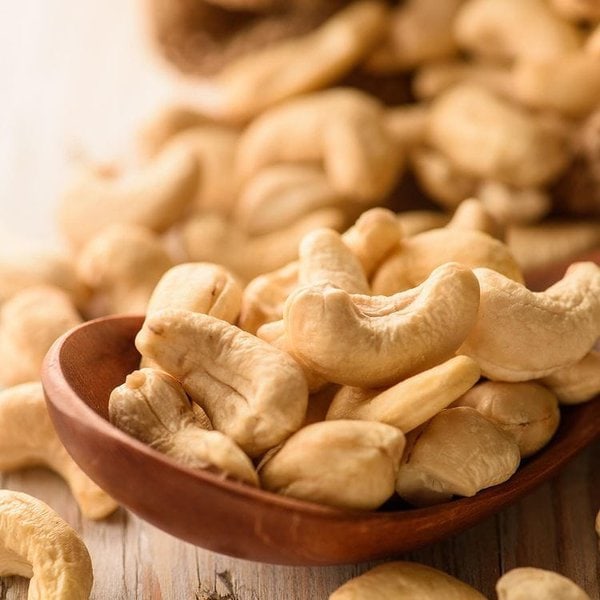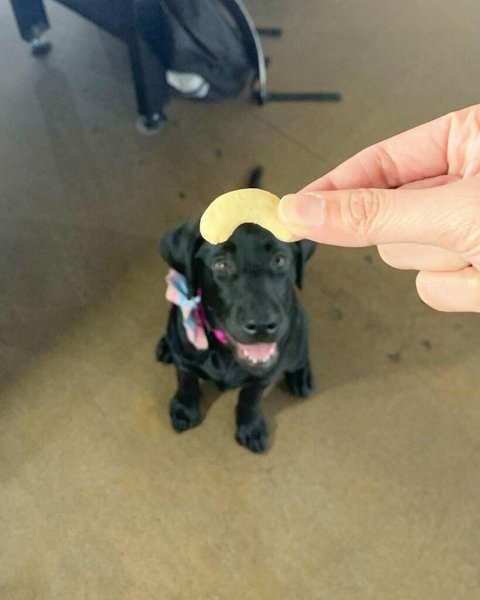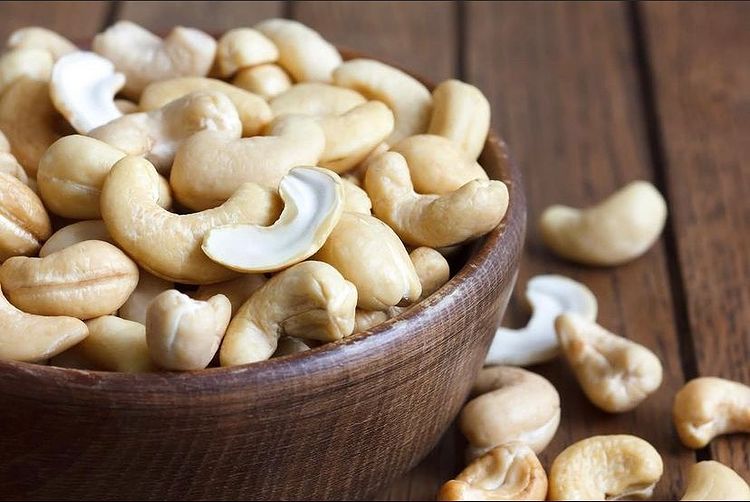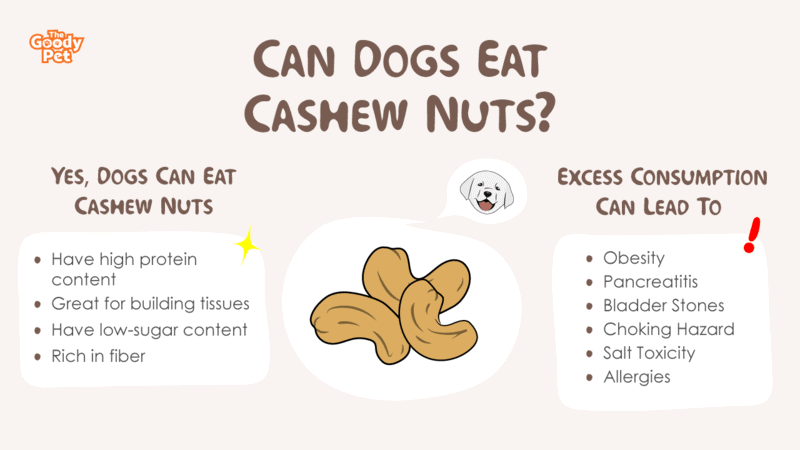Given the similarities between both, one could say cashew nuts are a distant relative of peanuts. And since dogs eat peanuts, could the same not apply to cashews?
The answer is yes, however not an emphatic one. Dogs can eat cashew nuts because these nuts have high protein content, great for building tissues. Cashew nuts also have low-sugar content and are rich in fiber that smoothens the digestion process in dogs.
But like peanuts, cashews have massive fat levels that significantly increase the likelihood of obesity in dogs. And battling obesity is one of the major problems most dog owners face because it affects the optimum function of the heart, which could spell doom for dogs in the long run.
Asides from obesity, several other unsavory effects abound when your four-legged pal consumes large quantities of cashews. As a caring and diligent dog owner who wants the best for your adorable canine and is seeking accurate information about cashew nuts and their effects on dogs, you’re at the right place.
This article provides helpful information on the benefits of cashew nuts, why too many cashews are harmful to dogs, things to consider before feeding dogs cashews, the right way to feed cashew nuts to a dog, and what to do if a dog eats cashews.
Are Cashews OK For A Dog?

Serving cashew nuts to dogs, in moderation, is generally fine as long as the number does not exceed more than five nuts. Excessive consumption of cashew nuts, on the other hand, is dangerous because the digestive system of a dog is different from a human.
Therefore, what a human would eat with convenience, a dog would eat and have a massive stomach upset along with other serious health complications. Here are some of the potential dangers and health complications that could result when your dear Fido ingests too many cashew nuts.
Obesity
The majority of dog breeds, such as the English Bulldog and the Beagles, gain massive weight quickly, especially when they eat foods with high calories. So should your pooch fall into the obesity-prone category, you’d want to be extra careful with treats like cashew nuts.
Cashew nuts contain lots of fat that could induce rapid weight gain in your dear Fido. And excessive weight gain within a short period could cause hip and joint problems, especially in young pups.
Furthermore, obesity causes heart diseases that reduce a dog’s vitality and significantly shorten its lifespan.
Pancreatitis
Pancreatitis is a common problem that develops when a dog’s liver cannot break down excess fat in its body. Essentially, the pancreas is overwhelmed by the overabundance of fat and starts to inflame, releasing toxic enzymes into your pooch’s body which endangers other vital organs.
Expectedly, inflammation causes severe abdominal pain and discomfort that may be followed by vomiting. Keep in mind that pancreatitis, when detected, requires urgent medication, or it may lead to death.
Bladder Stones
Bladder stones are tiny crystals that form when certain substances are present in high concentrations in your four-legged companion’s body. In the case of cashew nuts, phosphorus is the culprit that crystallizes to form small stones in your doggie’s bladder.
Consequently, the crystallized stones block the urinary tract and cause your canine companion to experience painful stings during urination.
Choking Hazard
Typically, your furry buddy would sniff its meal before consuming it. But the danger with small-sized edibles like cashew nuts is that dogs could mistakenly sniff too hard and get one or two nuts lodged in their nasal cavities.
A cashew nut blocking the nostrils or the trachea could cause suffocation within seconds, which could lead to death.
Salt Toxicity
Although cashew nuts don’t contain much sodium, the processing and packaging mainly entail a salting process. And foods with high sodium concentrations are detrimental to your puppy’s health because excess salt destroys cells and hampers proper brain function.
Allergies
As is with humans, cashew nuts could cause adverse reactions in dogs with allergies.
Anaphylaxis is the term used to describe oversensitivity to an allergen that could induce life-threatening symptoms. And studies have shown that allergens are present in nearly all US homes.
So, feeding your canine pal cashew nuts, even when it doesn’t have an allergy, could be disastrous. And sometimes, many a dog parent doesn’t even know about their dog’s allergy until it’s too late. Hence, there’s a cause to be watchful minutes after throwing some nuts at your beloved canine.
Here are some of the signs of allergies to watch out for:
Hives
Hives show up as tiny, red dots covering parts of a dog’s body when there’s an allergic reaction. The dots usually erupt within a few hours of ingestion and could cause itching and restlessness.
Rhinitis
Inflammation of the nose could be a sign of an allergy. For example, when dogs develop Rhinitis, the mucous membranes swell and obstruct the free flow of air through the nostrils. Rhinitis also causes nasal discharge and makes breathing difficult.
Watery Eyes
Watery eyes in dogs are a clear indication of viral infection or allergy. A dog with watery eyes would develop blurry vision, constantly dab at its eyes, and could hurt itself in the process.
What To Consider Before Feeding Cashews?

Cashew nuts, while not recommended, could suffice as treats for your dear canine, considering your dear Fido doesn’t consume too many nuts.
Therefore, if you love to eat cashew nuts and want to share some, you should take care to observe the following precautions, so you don’t endanger your furry friend in the process.
Avoid Packaged Cashew Nuts
Typically, many packaged nuts contain salt or sugar that could lead to either salt poisoning or obesity.
Generally, humans have evolved over the centuries to handle high salt and sugar levels in their systems, but dogs haven’t. So, it’s best not to test your doggie’s digestive system.
Also, packaged foods contain tiny amounts of additives and chemical compounds, which, however minor, could cause an allergic reaction in dogs.
Avoid Feeding Raw Cashew Nuts
Undoubtedly, numerous benefits abound from eating fresh fruits and nuts. However, feeding your furry pal raw nuts indirectly courts trouble because harmful bacteria grow on raw nuts.
For instance, Salmonella, a bacteria responsible for several disastrous effects on an animal’s body, like food poisoning and fever, could enter your pooch’s system through the ingestion of raw nuts.
Watch Out For Moldy Nuts
Moldy nuts contain Aflatoxin, a dangerous toxin that originates from certain fungi groups. Aflatoxin has been a significant concern in animals because these harmful fungi almost always exist on moist and partially decayed feed.
What’s worse is that Aflatoxin may be present in edible substances like cashew nuts and still wouldn’t appear as mold visible to the naked eye. Hence, increasing the risk of your doggie unknowingly consuming endangering food substances.
When ingested in large quantities, Aflatoxin induces cancer, damages the liver, and ultimately leads to death in dogs.
Essentially, the best way to prevent Aflatoxicosis — the consequent disease of Aflatoxin — in your dear Fido is to ensure that all cashew nuts are fed fresh. Also, understand that processed nuts have a short shelf life, and consumption should be no more than a few days after opening.
Only Feed Healthy Dogs Cashews
It goes without saying that dogs with underlying health issues shouldn’t eat cashews. That’s because the high-fat content present in cashew nuts could further strain ailing organs in a dog’s body. In other words, only feed your furry buddy cashew when it is still a young puppy and has enough energy to exercise and burn fat.
How To Feed Cashew To My Dog?
Feeding cashews to dogs requires nothing special except following certain precautions. Some of which are:
Buy And Prepare Raw Cashews Yourself
Evidently, factory-processed nuts are not the best option because of the chemicals and compounds entailed in producing the nuts.
It’s safer to buy raw nuts and prepare them yourself. That way, you’re in charge of the processing from start to finish. And since you know when the nuts were processed, you’ll know exactly how long to store them.
Serve Cooked Cashews
There are two primary methods of preparing cashews: cooking and roasting.
Experts recommend cooking cashews because, compared to roasting, the heating process doesn’t destroy the nutrients and vitamins in the nuts.
Nonetheless, that’s not to say that roasted cashews have depleted vitamins. Instead, it means that roasting is a delicate process that could destroy essential nutrients if not done with care.
What’s worse, poorly roasted nuts could harbor a dangerous compound called Acrylamide which forms when amino compounds in the nuts are exposed to extreme heat.
Acrylamide is carcinogenic and could harm your four-legged pal if it consumes roasted nuts prepared with extreme heat.
Dog parents who’d like to enjoy the crispy taste roast nuts deliver should expose cashews to medium heat for 15 to 20 minutes to avoid acrylamide formation.
Summarily, it’s best to go with the cooked option so your pooch can enjoy all the nutrients cashew nuts give.
Feed Cashew Nuts One At A Time
If your furry buddy is about to have cashews for the first time, it’s best to feed the nuts in bits. Feeding in bits allows you to monitor your doggie’s behavior and see if it reacts strangely to the treat. It also helps prevent a choking hazard since you’ll be tossing the nuts straight into its mouth.
Alternatively, you could sprinkle the nuts as a decorative topping on your furry pal’s meal. Do ensure not to overdo it. Remember, it’s a treat, not a meal.
What To Do If My Dog Eats Cashew Nuts?
Sometimes, your furry companion could act naughty and start mouthing cashews left on the kitchen table. Ideally, a few eaten nuts wouldn’t harm your doggie, so you don’t have to worry too much.
However, if you notice it’s had more than a fair amount of nuts, you should withdraw the nuts immediately and call the vet. While awaiting the veterinary doctor, you could give your pooch plenty of water to ease the digestion process.
Depending on the quantity consumed and the severity of the illness that follows, the vet could either administer drugs for abdominal relief or admit your furry companion for further intensive treatment.






